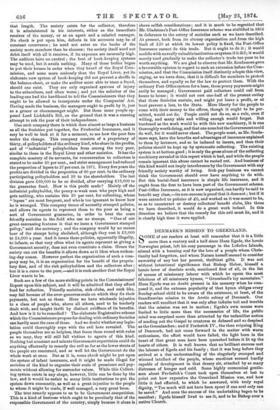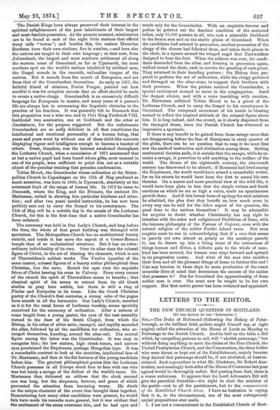DENMARK'S MISSION TO GREENLAND.
SOME of our readers at least will remember that it is a little more than a century and a half since Hans Egede, the heroic Norwegian priest, left his cosy parsonage in the Lofoden Islands, stirred with a burning zeal for the love of a people whom Chris- tianity had forgotten, and whom Nature herself seemed to consider unworthy of any but her poorest, thriftiest gifts. It was not without intentional significance that Bishop Heber, himself a heroic lover of desolate souls, mentioned first of all, in the list of scenes of missionary labour with which he opens the most felicitous of all missionary hymns, "Greenland's icy mountains." Hans Egede was no doubt present in his memory when he com- posed it, and the extreme popularity of that hymn obliges every Sunday-school child to be aware of the existence, at least, of the Scandinavian mission to the Arctic colony of Denmark. Our readers will recollect that it was only after infinite toil and trouble that the mission was set in motion ; Egede's own means were limited to little more than the necessaries of life, the public mind was surprised more than attracted by the unfamiliar notion of sending out the Gospel to creatures so debased and so despised as the Greenlanders ; and if Frederick IV., the then reigning King of Denmark, had not come forward in the matter with warm enthusiasm, the effort would have failed, the light born in the heart of that great man have been quenched before it lit up the hearts of others. It is well known that no brilliant success met the labours of Egede and his family ; that it was long before they arrived at a due understanding of the singularly cramped and wizened intellect of the people, whose emotions seemed hardly capable of development in that dreary air, attacked by so many distresses of hunger and cold. Some highly economical gentle- men about Frederick's Court took upon themselves at last to point out how expensive the Greenland Mission was, and how little it had effected, to which he answered, with truly royal dignity, "Too much will not have been spent if one soul only can be saved." And soon the success of the undertaking began to be manifest ; Egede himself lived to see it, and to be Bishop over a native Chtuth. The Danish Kings have always preserved their interest in the spiritual enlightenment of the poor inhabitants of their largest and most desolate possession. At the present moment, missionaries are to be found at each of the eight little stations that official irony calls "towns "; and besides this, the zealous Moravian Brethren have their own stations, five in number,--and here also the natives are taught in their own language ; so that now, from Julianehaab, the largest and most southern settlement all along the western coast of Greenland, as far as Upernavik, the most northern spot on the world's surface inhabited by civilised men, the Gospel sounds in the uncouth, unfamiliar tongue of the natives. But it sounds from the mouth of Europeans, and not from that of the Greenlanders themselves. As early as 1837, the faithful friend of missions, Pastor Fenger, pointed out how needful it was for complete success that an effort should be made to create a native clergy. Greenlandish is an excessively difficult language for Europeans to master, and many years of a pastor's life are always lost in overcoming the linguistic obstacles to the practice of his function. It was generally felt in Denmark that this proposition was a wise one, and in 1844 King Frederick VIII. instituted two seminaries, one at Godthaab and the other at .Jacobshavn, for the purpose suggested. But the unfortunate Greenlanders are so sadly deficient in all that constitutes the intellectual and emotional personality of a human being, that years and years went by without one of these child-like converts displaying vigour and intelligence enough to become a teacher of others. Great, therefore, was the interest awakened throughout the Lutheran Church, when a commission of 1871 announced that at last a native pupil had been found whose gifts, most unusual in one of his people, were sufficient to point him out as a suitable ,object of the peculiar training that precedes confirmation.
Tobias Morch, the Greenlander whose ordination at the Metro- politan Church in Copenhagen on the 13th of May produced so much sensation, was born in 1840, in Upernavik, absolutely at the outermost limit of the range of human life. In 1872 he came to Denmark, where the King, and the Primate, the eminent Dr. Martensen, united in showing him particular kindness and atten- tion; and after two years' careful instruction, he has now been publicly sent out to carry the Gospel to his countrymen. The 13th of May will be a notable day in the annals of the Lutheran Church, for this is the first time that a native Greenlander has been ordained.
The ceremony was held in Our Lady's Church, and long before the time, the whole of that great building was thronged with spectators. The Metropolitan Church has no architectural beauty outside, and inside it has more the aspect of a Grmco-Roman temple than of an ecclesiastical structure. But it has an extra- ordinary individuality of its own. Over its altar rises the colossal figure of Christ, in the act of blessing the elements, which is one of Thorwaldsen's noblest works. The Twelve Apostles of the same master, colossal figures of a beauty rather philosophical than Christian, line the nave. Round the apse runs the exquisite frieze of Christ bearing his cross to Calvary. From every corner of the church the spirit of Thorwaldsen seems to breathe ; that classical spirit of his seems to retreat from its old Greek studies to pray here awhile, but there is still a ring of Pindar and Euripedes in its tones. Like the Greek Christian poetry of the Church's first centuries, a strong echo of the pagan form sounds in all the harmonies. Our Lady's Church, unsuited as it is for the usual forme of Lutheran worship, seems specially contrived for the ceremony of ordination. After a sermon of some length from a young pastor, the eyes of the vast assembly turned to the door of the South Chapel, from which the Bishop, in his robes of silver satin, emerged, and rapidly ascended the altar, followed by all the candidates for ordination, who ar- ranged themselves, kneeling, around the altar-rail. The central figure among the latter was the Greenlander. It was easy to recognise him ; his low stature, high cheek-bones, and narrow eyes proclaimed the Esquimanx, perhaps Mongolian type. It was a remarkable contrast to look at the sensitive, intellectual face of Dr. Martensen, and then at the flat features of the young candidate before him. The greatest philosophical genius that the Lutheran Church possesses in all Europe stood face to face with one who was but lately a savage of the dullest of the world's races. Dr. Martensen then delivered an address that the clock assured one was long, but the eloquence, fervour, and grace of which prevented the attention from becoming weary. He dwelt on the unique character of the event that brought them together. Remembering how many other candidates were present, he would fain have made his remarks more general, but it was evident that the excitement of the scene overcame him, and he had eyes and words only for the Greenlander. With an exquisite fervour and pathos be pointed out the desolate condition of the scattered tribes, only 10,000 persons in al], who seek a miserable livelihood in the frozen seas and on the sterile plains of Greenland. When the candidates had entered in procession, another procession of the clergy of the diocese had followed them, and taken their places in the choir, in a square around the winged angel that Thorwaldsen designed to bear the font. When the address was over, the candi- dates descended from the altar, and forming in procession again, walked round the choir, each to receive the greeting of each priest. They returned to their kneeling posture ; the Bishop then pre- pared to perform the act of ordination, while the clergy gathered and thronged on the altar-steps, to support their brethren with their presence. When the prelate reached the Greenlander, a special excitement seemed to move in the congregation. Amid the deepest silence, and with a voice trembling with emotion, Dr. Martensen ordained Tobias Miirch to be a priest of the Lutheran Church, and to carry the Gospel to his countrymen in Greenland. The outspread movement of his hands in blessing seemed to reflect the inspired attitude of the colossal figure above him. It is long indeed, said the crowd, as it slowly dispersed from the thronged doors, since the Danish Church has witnessed so impressive a spectacle.
If there is any benefit to be gained from those savage races that are disappearing before the face of Europeans in every quarter of the globe, there can be no question that to reap it we must first sow the seeds of instruction and civilisation among them. Setting sentimental theories aside, it is certain that the savage, while he re- mains a savage, is powerless to add anything to the welfare of the world. The dream of the eighteenth century, the nineteenth century has discovered to be absurd ; if Rousseau had lived among the Esquimaur, the world would have missed a remarkable writer, for on his return he would have been the first to cancel his own theories. On a nearer and more practical view of the wild life, it would have been plain to him that the simple virtues and frank emotions on which he set so high a value, made no spontaneous growth there. And if this lowest form of apology for such missions be admitted, the plea that they benefit us, bow much more in every way can be said for the other aspect of the question, the good done to the natives themselves I It may be admissible for sceptics to doubt whether Christianity has any right to interfere with the sober and enlightened Buddhism of Siam, with the humane philosophy of the Parsers of Gujerat, even with the natural religion of the nobler Pacific Island races. But even sceptics must be one in acknowledging that if a race that seems to parody our own almost as grimly as the monkeys parody it, can be drawn up into a living sense of the seriousness of things human and divine, a definite gain to the whole of man- kind has been secured, the human race steps forward and upward in its progressive course. And what of the men who sacrifice their lives and all the pleasant things of home to further this end ? Can any heroism in these days be more productive of the exact muscular fibre of mind that determines the success of the nation that possesses it? But for Greenland the apprenticeship of these nobler men is over. She must now be taught to be her own support. Her first native pastor has been ordained and appointed.



































 Previous page
Previous page